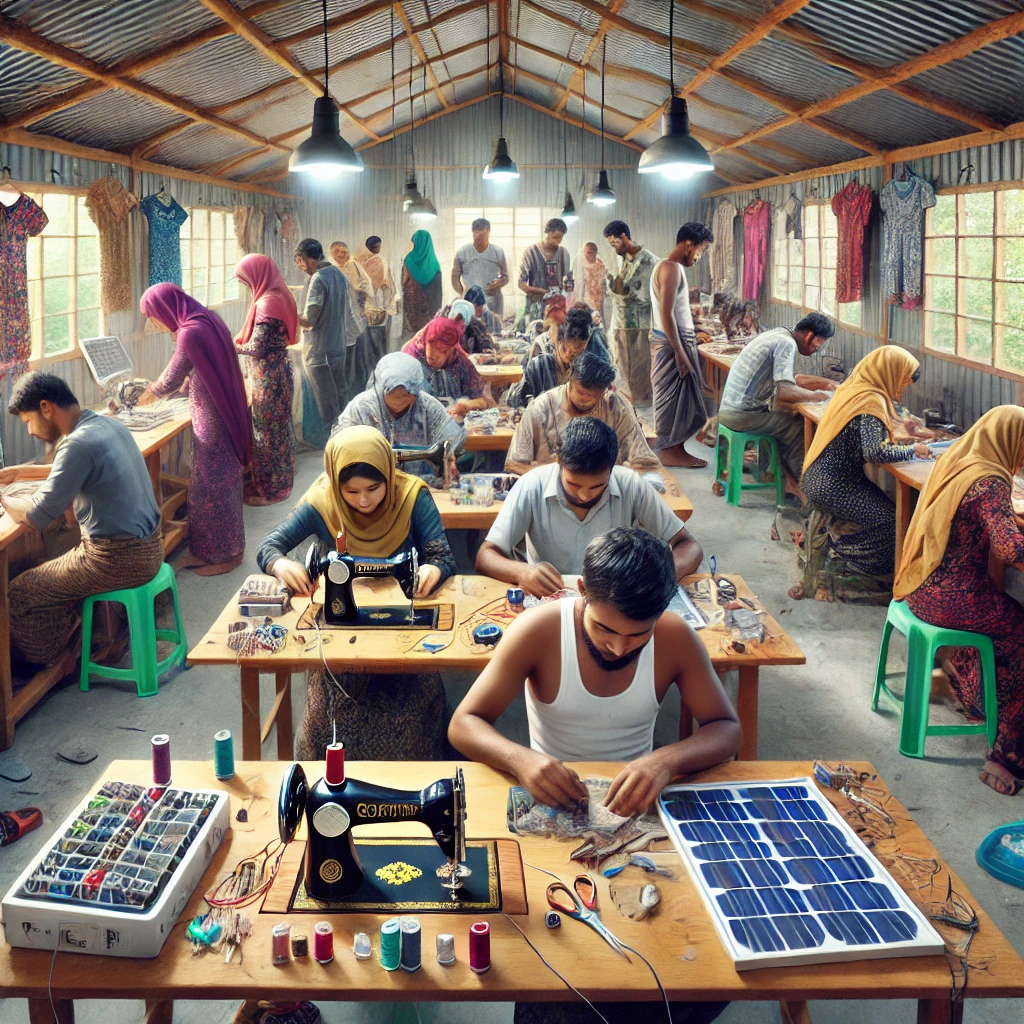Empowering Rohingya Refugees Through Skills Development: A Pathway to Employment and Self-Reliance
The skills development program is being implemented through a broad network of partners and stakeholders in Cox’s Bazar, including the ILO ISEC project.

- Country:
- Bangladesh
In a groundbreaking initiative, the International Labour Organisation (ILO), in collaboration with the United Nations Refugee Agency (UNHCR) and the International Organisation for Migration (IOM), has successfully implemented the first-ever competency-based skills development framework for Rohingya refugees in Bangladesh. This initiative aims to equip refugees with critical employability skills, paving the way for decent work opportunities upon repatriation to Myanmar or resettlement in other countries.
A Demand-Driven Approach to Skills Training
Competency-based training (CBT) is a structured system that enables individuals to acquire the skills and knowledge required to perform specified work activities to expected industry standards. This demand-driven training is designed to be flexible, delivered in modules, and ensures mastery of industry-relevant skills for better integration into the labour market.
For years, the Rohingya, the world’s largest stateless population according to UNHCR, faced significant challenges in accessing formal CBT due to the absence of a recognized national framework. However, a major breakthrough came in August 2022 when Bangladesh endorsed the Government of Bangladesh – United Nations Framework on Skills Development for Rohingya Refugees and Host Communities. This endorsement provided a structured pathway to equip refugees with marketable skills vital for employment and entrepreneurship.
Identifying Skill Needs and Aligning with International Standards
With support from the Canadian-funded ILO ISEC (Improving Skills and Economic Opportunities for the Women and Youth in Cox’s Bazar, Bangladesh) project, UNHCR conducted an assessment in 2022 to evaluate the skill levels, education backgrounds, and employability of Rohingya youth aged 18 to 24 in Cox’s Bazar and Bhasan Char.
This assessment informed the development of an appropriate competency-based training framework that aligns with both the Myanmar National Qualification Framework and the ASEAN Qualifications Reference Framework, facilitating labour mobility and greater economic opportunities for the refugees.
Key Occupations and Training Opportunities
As a result, standardized training packages have been developed for ten priority occupations identified by the refugees themselves. Each occupation has its own competency standards and course accreditation to ensure quality training. The ten CBT courses currently offered to the refugees include:
- Sewing Machine Operation
- Plumbing
- Concreting
- Small Engine Mechanics
- Building Electricians
- Crop Production
- Community Health Workers
- Caregiving
- Solar PV Installation and Maintenance
- Baking
Impact and Future Prospects
According to Tuomo Poutiainen, ILO Country Director for Bangladesh, the competency-based training framework is crucial in ensuring that Rohingya refugees are no longer left behind in global labour markets. "Skills development is a critical pathway to social justice for refugees, equipping them with the ability to integrate into labour markets wherever they may end up," he emphasized.
To date, more than 5,500 Rohingya refugees in Cox’s Bazar and Bhasan Char have successfully completed and graduated from various CBT programs. The impact of this training has been transformative, enabling them to:
- Volunteer in camps
- Start and run businesses, such as tailoring and food production
- Gain employment in relevant sectors
The skills development program is being implemented through a broad network of partners and stakeholders in Cox’s Bazar, including the ILO ISEC project. By fostering self-reliance among the refugees, this initiative is providing a beacon of hope and a sustainable future for thousands of displaced individuals.
This competency-based training initiative represents a significant step toward empowering Rohingya refugees with industry-standard skills, facilitating their economic independence and future employment opportunities. By aligning the training with international frameworks, the initiative ensures that refugees are well-prepared to contribute to labour markets across multiple regions, ultimately fostering dignity and self-reliance among one of the world’s most vulnerable populations.










